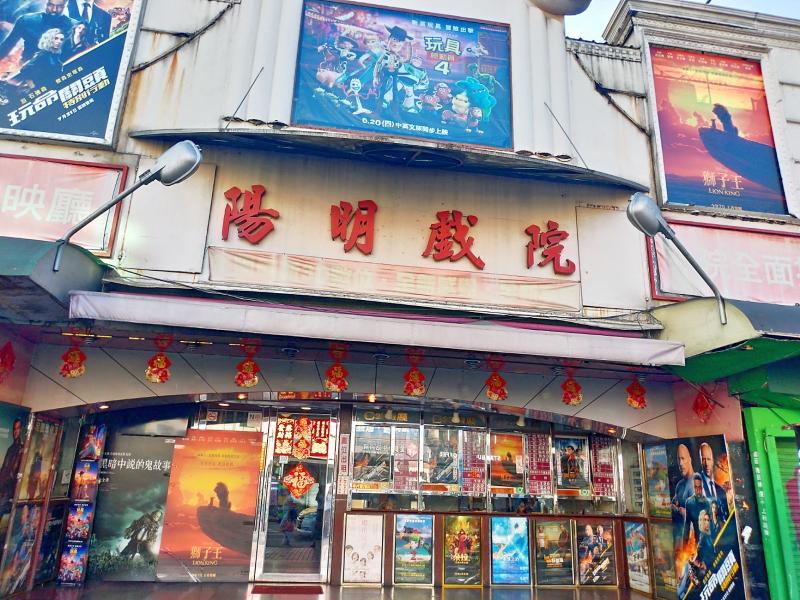State-run Hua Nan Commercial Bank (華南銀行) last week said that it is teaming up with the 70-year-old Yangming Theater (陽明戲院) in Taipei’s Shilin District (士林) to pursue urban renewal and help it transform into a mixed-use complex.
The venture would help enhance Hua Nan Commercial’s environmental, social and corporate governance (ESG) rating.
The Financial Supervisory Commission in September last year included financing of old buildings in ESG ratings, giving Hua Nan Commercial an additional incentive to help with the project, the lender said.

Photo: Tsai Ya-hua, Taipei Times
The planned complex would retain the name of Yangming Theater to help people gain a better understanding of its history, Hua Nan Commercial added.
The complex is to have eight floors above ground and two basement floors, with retail stores to occupy the first and second floors, restaurants to occupy the third floor and movie theaters to occupy the fourth to eighth floors, the lender said.
FINANCING
Financing for urban renewal projects are not subject to selective credit controls that the central bank introduced in December last year and March to curb increases in property prices.
Hua Nan Commercial said that as of April, it had processed NT$29 billion (US$1.05 billion) of trust funds related to urban renewal projects, showing that it assigns great importance to supporting a key government policy.
Hua Nan Commercial and other listed companies in Taiwan are shoring up their ESG ratings, which serve as an investment guide for shareholders.

Taiwan Semiconductor Manufacturing Co (TSMC, 台積電) yesterday said that its investment plan in Arizona is going according to schedule, following a local media report claiming that the company is planning to break ground on its third wafer fab in the US in June. In a statement, TSMC said it does not comment on market speculation, but that its investments in Arizona are proceeding well. TSMC is investing more than US$65 billion in Arizona to build three advanced wafer fabs. The first one has started production using the 4-nanometer (nm) process, while the second one would start mass production using the

‘SILVER LINING’: Although the news caused TSMC to fall on the local market, an analyst said that as tariffs are not set to go into effect until April, there is still time for negotiations US President Donald Trump on Tuesday said that he would likely impose tariffs on semiconductor, automobile and pharmaceutical imports of about 25 percent, with an announcement coming as soon as April 2 in a move that would represent a dramatic widening of the US leader’s trade war. “I probably will tell you that on April 2, but it’ll be in the neighborhood of 25 percent,” Trump told reporters at his Mar-a-Lago club when asked about his plan for auto tariffs. Asked about similar levies on pharmaceutical drugs and semiconductors, the president said that “it’ll be 25 percent and higher, and it’ll

When an apartment comes up for rent in Germany’s big cities, hundreds of prospective tenants often queue down the street to view it, but the acute shortage of affordable housing is getting scant attention ahead of today’s snap general election. “Housing is one of the main problems for people, but nobody talks about it, nobody takes it seriously,” said Andreas Ibel, president of Build Europe, an association representing housing developers. Migration and the sluggish economy top the list of voters’ concerns, but analysts say housing policy fails to break through as returns on investment take time to register, making the

CHIP BOOM: Revenue for the semiconductor industry is set to reach US$1 trillion by 2032, opening up opportunities for the chip pacakging and testing company, it said ASE Technology Holding Co (日月光投控), the world’s largest provider of outsourced semiconductor assembly and test (OSAT) services, yesterday launched a new advanced manufacturing facility in Penang, Malaysia, aiming to meet growing demand for emerging technologies such as generative artificial intelligence (AI) applications. The US$300 million facility is a critical step in expanding ASE’s global footprint, offering an alternative for customers from the US, Europe, Japan, South Korea and China to assemble and test chips outside of Taiwan amid efforts to diversify supply chains. The plant, the company’s fifth in Malaysia, is part of a strategic expansion plan that would more than triple